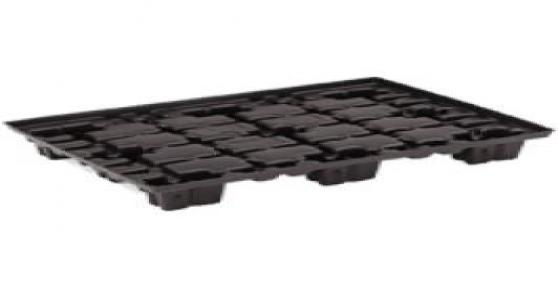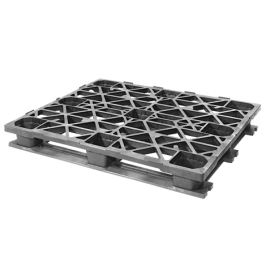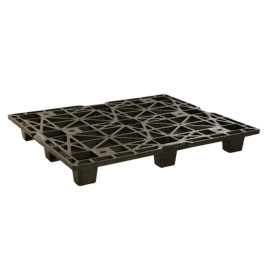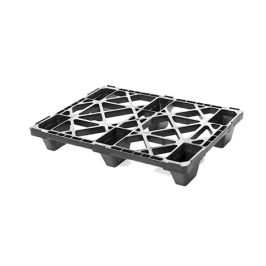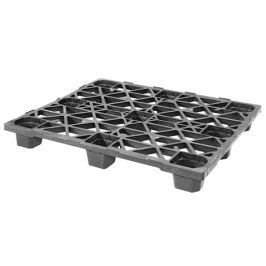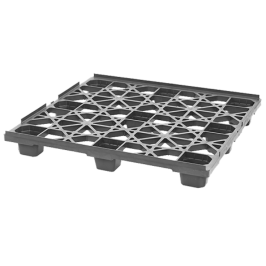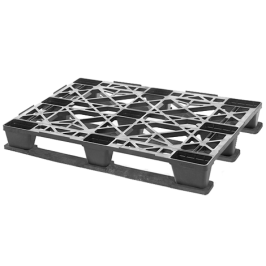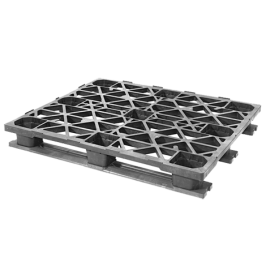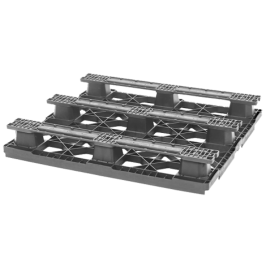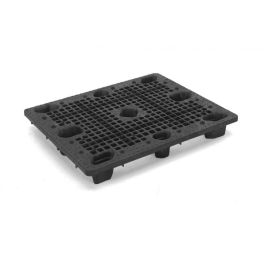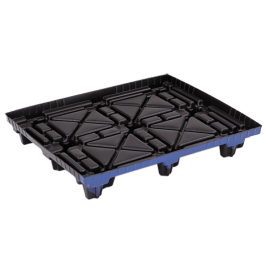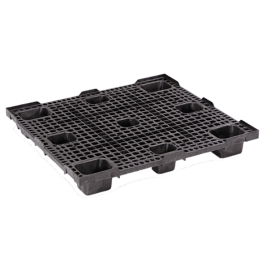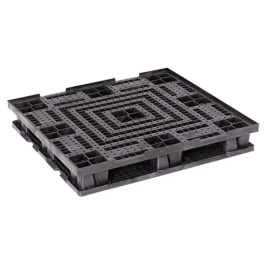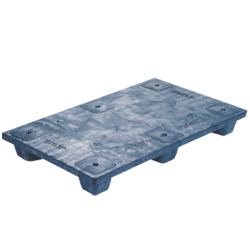
Plastic Pallets
Plastic Pallets Are Reusable, Dependable and Customizable
For decades, warehousing and industrial operations relied on pallets made of wood for their product storage and transportation needs. However, there are certain drawbacks to wood pallets, including limited durability, the occasional inability to meet today’s sanitation standards and potential injuries caused by wood splinters.
Many companies are making the transition to pallets made from plastic substances — such as high-density polyethylene, (HDPE), low-density polyethylene (LDPE), polypropylene (PP), copolymer blends and various recycled plastic materials.
Plastic Pallet Uses
Plastic pallets have numerous applications. Many types of plastic pallets are FDA- and USDA-approved, which makes them the ideal choice for hygiene- and sanitation-conscious industries such as food and beverage, meat processing and pharmaceuticals. Some models include recessed rings, which serves the needs of companies that transport materials stored in 55-gallon drums. Because of their user-specific design and construction, plastic pallets are also a popular choice for shipping goods by air.
Retail stores also use plastic pallets for in-store displays. Workers can use a pallet jack to pull the self-contained display onto the sales floor. All they have to do is unwrap it, and it's ready to go. Manufacturing operations rely on heavy-duty industrial plastic pallets, typically made with PP materials, to meet their product distribution requirements.
Benefits of Plastic vs. Wood Pallets
Plastic pallets offer numerous advantages over wood. Here are some of the primary benefits of plastic pallets:
- Non-porous: The plastic material won't absorb water when it's wet. Consequently, plastic pallets are durable and washable, and they also maintain consistent weight and dimensions over time.
- Infestation-proof: Unlike with wood, bugs can't damage plastic pallets. As a result, they don't require certification when they're used for exporting goods.
- Safer to handle: Wood pallets can splinter and often contain rusty or exposed nails and sharp edges that can cause injuries. None of these issues apply to plastic pallets.
- Long-lasting: Reusable plastic pallets can last up to 10 years. On the other hand, wood pallets typically have a much shorter lifespan. Thus, plastic can provide a better return on investment than wood.
Choose From Several Types of Plastic Pallets
Cherry's Material Handling, the e-commerce platform for Cherry's Industrial Equipment, features a variety of plastic pallets for sale, including:
- Drum: Includes four recessed rings for accommodating 55-gallon drums
- Nestable: Pallets "nest" inside one another when stacking, which requires less storage space
- Rackable: Designed for storing heavy loads in warehouse racks
- Solid top: Features a smooth surface that's easy to clean
- Slave board: Meets the material handling needs of automated distribution center environments
- Stackable: Designed to stack on top of each other without slipping
- Export: Light weight pallets that exceed the ISPM 15 guidelines for international shipping
- Automotive: Used for exporting automotive parts and components
- ProStack: Structural foam pallet for food processing, beverage and pharmaceutical material handling applications
- Custom: We offer strong, versatile and durable custom-made pallets that are suitable for a variety of applications.
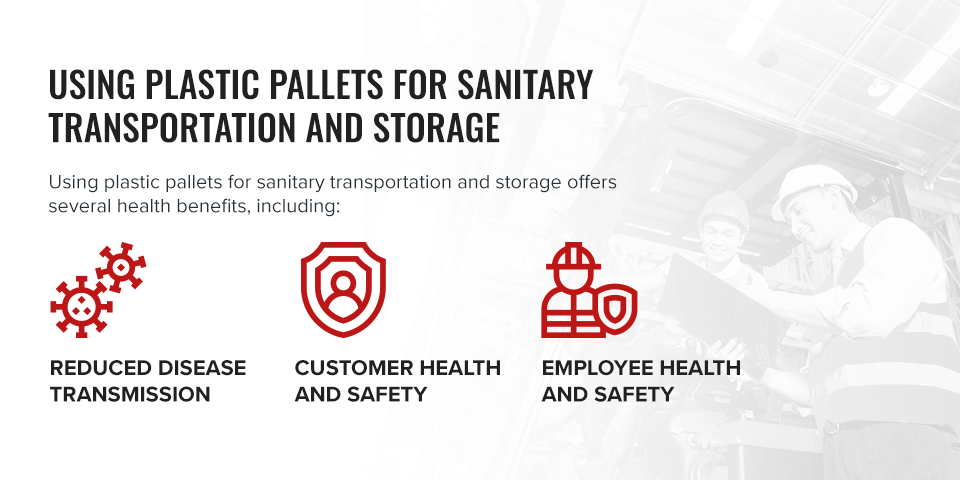
Using Plastic Pallets for Sanitary Transportation and Storage
Using plastic pallets for sanitary transportation and storage offers several health benefits, including:
1. Reduced Disease Transmission
Because of their smooth, non-porous surface, plastic pallets are inhospitable environments for microorganisms. They are washable by design and as a result are a great choice to help keep your work area clean. Around the world, about 420,000 people die every year because of contaminated food — and 40% of those people are young children. Using plastic pallets to transport and store food helps reduce the risk of cross-contamination of products and the transmission of foodborne illnesses.
2. Customer Health and Safety
The sanitary benefits of using plastic pallets for food transportation and storage translate directly into health benefits for consumers. Consumers want to know the food they purchase has been stored and shipped safely, and using plastic pallets helps give them that peace of mind. Using sanitizable plastic pallets also allows you to reduce the risk of transmitting employee illnesses to customers.
3. Employee Health and Safety
The sanitary benefits of using plastic pallets for food transportation and storage translate into health benefits for employees as well. Although they are not as likely to consume the food in question, they spend much more time than consumers handling the food products and their storage and transport containers. Under these circumstances, food containers could easily spread illness from one employee to the next, but using easy-to-sanitize plastic pallets helps reduce the risk of transmission.
How to Choose the Right Pallet
When you're selecting pallets for your business, particularly when you're thinking about wooden pallets vs. plastic pallets, here are a few considerations to keep in mind:
1. The Needs of Your Industry
In some industries, where basic wooden pallets have been in use for years, switching might not offer much return on investment. In many industries, though, especially food-processing industries, plastic pallets work better for delivering fresh, quality products. In others, you'll want to look for industry-specific pallets. And if you plan to export products abroad, you'll need pallets that meet the international requirements for the transportation of goods. The choice of pallets will depend on your specific industry's needs and standards.
2. The Goals of Your Business
Your business may have specific goals for using its pallets. If longevity is a lower priority and you're happy to replace old pallets as they break down, wooden pallets remain an option of choice. If you want your pallets to last longer and be, for example, nestable, rackable or safer to handle, plastic pallets offer an appealing alternative. If you plan to run your pallets through an automated pallet washer to boost cleanliness and save time, plastic pallets will likely work best.
3. The Health and Safety of Your Employees and Customers
When you're choosing pallets, health and safety are among your main priorities. Because of their resistance to bacterial and viral growth and how convenient they are to clean and sanitize, plastic pallets are an excellent choice. Especially if you plan to use your pallets for sanitary transportation and storage, plastic pallets are one of your best options.
Why Choose Plastic Pallets From Cherry's Material Handling?
Cherry's offers high-quality plastic pallets at competitive prices — along with the best service in the material handling equipment industry. Our team includes knowledgeable product specialists who can help you choose equipment that will solve a specific problem in your warehousing environment.
You'll also appreciate our compact, easy-to-navigate e-commerce site, which enables hassle-free buying. You'll find what you're looking for much more quickly than you would by leafing through bloated paper catalogs or confusing websites.
Browse Our Selection of Plastic Pallets
Take a moment to review our entire collection of plastic pallets for sale. If you have questions or need assistance, feel free to give one of our product specialists a call at 877-350-2729 or contact us online at your convenience.
For more information on this, see our related resources:


